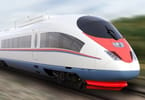Airbus makes over half the world’s single aisle and wide body aircraft – and honey. That’s right, honey. What’s the link you may ask? It’s quite simple.
The company has its own full time beekeeper Eberhard Schädlich who collects honey from hives installed close to the Airbus paint shop just outside Hamburg and another next to the runway where new aircraft carry out test flights.
Airbus as a major industrial company takes its green footprint very seriously and wants to make sure that its impact on the environment is kept to a minimum. And bees can help.
Since the bees collect pollen and nectar from hundreds of thousands of flowers over a region of 12 km square they provide crucial data on the quality of the surrounding soil, water and air.
Its called bio-monitoring and the honey produced at these hives is analyzed by an independent laboratory. And the feedback is overwhelmingly positive.
Volker Hase is head of environmental policy at the Airbus factories in Hamburg,
Volker Hase: “We always try to keep our impact on the environment as low as possible. We are producing aircraft so there is an impact but I think Airbus is pretty aware of this impact and always trying to measure how high this is and keep it as low as possible because you can only reduce pollution, you can only reduce your impact on your surroundings if we are really aware of what is coming into nature from our work.”
The project was launched five years ago and the findings are overwhelmingly positive.
Any metal or chemical deposits in the flowers would be detected in the honey. The lab tests show that the pollution levels are no higher here than off the Airbus premises and even lower than Hamburg city centre. The team behind bio-monitoring say the bees have become Ambassadors for Airbus’s global Green Wave initiative.
Volker Hase: “I am very proud it’s a part to help improve our impact on the environment…From the first moment we started this project we had the full support of the site management because they understood that environmental aspects play a big role at Airbus and these bees are a significant part in keeping track of our impact on the nature.”
Before switching to bee-keeping Eberhard use to be an airbus electronics technician. He says his new line of work is very special.
Eberhard Schädlich, Airbus bee-keeper: “Bee monitoring never existed here before and its very interesting because we do it from year to year and we have the results from the laboratory each year. We have tested three different parameters this year, wax, pollen and honey from two different beehive locations. And we are very proud to say that every single result shows that pollution levels are well under approved limits.”
The tens of thousands of Airbus bees produce more than 160 kilos of honey each year that’s enough for more than 600 jars of Airbus Honey.
They are not sold but given away as presents to clients, suppliers and Airbus staff and their families and it’s clearly a hit on breakfast tables everywhere.
WHAT TO TAKE AWAY FROM THIS ARTICLE:
- “I am very proud it’s a part to help improve our impact on the environment…From the first moment we started this project we had the full support of the site management because they understood that environmental aspects play a big role at Airbus and these bees are a significant part in keeping track of our impact on the nature.
- We are producing aircraft so there is an impact but I think Airbus is pretty aware of this impact and always trying to measure how high this is and keep it as low as possible because you can only reduce pollution, you can only reduce your impact on your surroundings if we are really aware of what is coming into nature from our work.
- Airbus as a major industrial company takes its green footprint very seriously and wants to make sure that its impact on the environment is kept to a minimum.






















